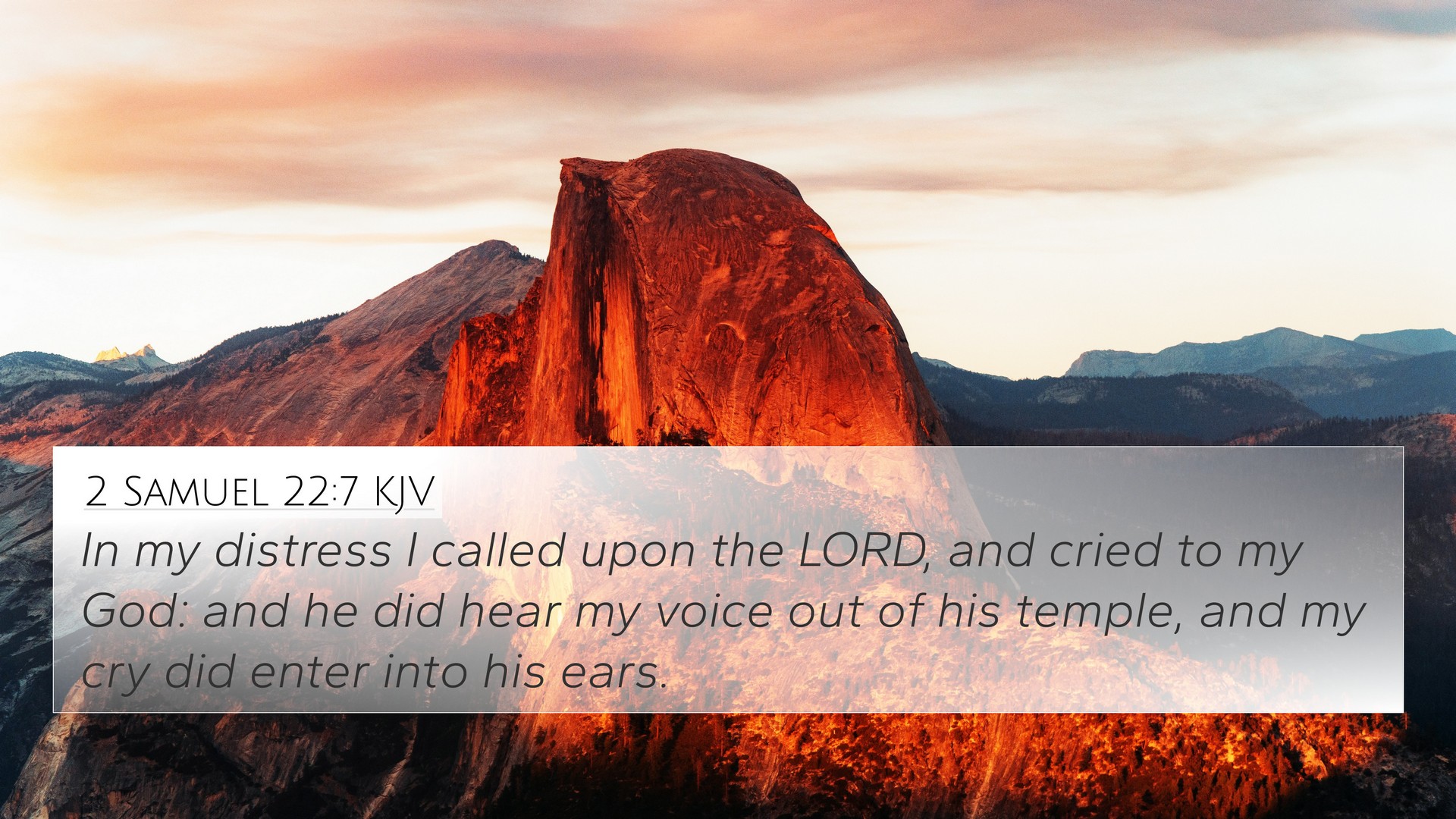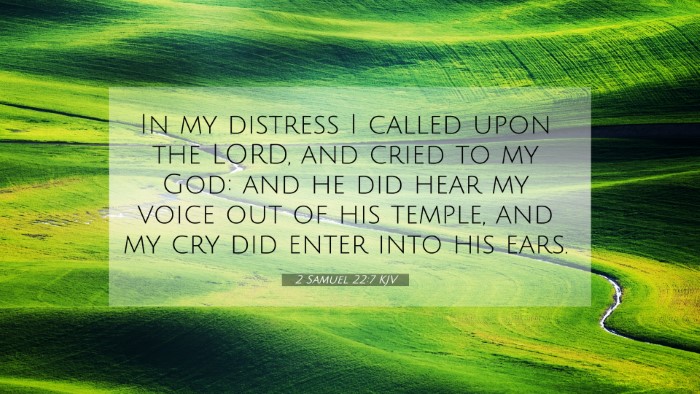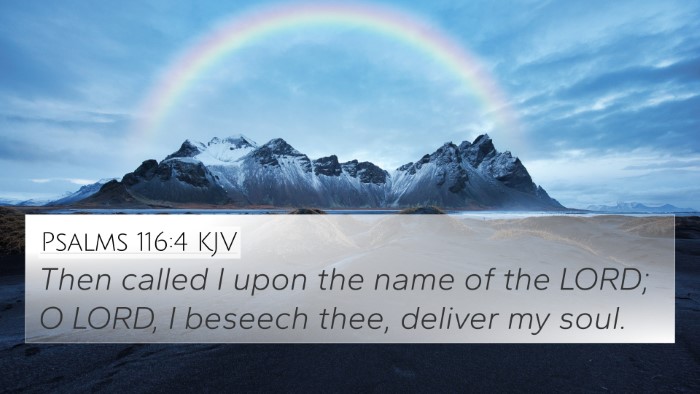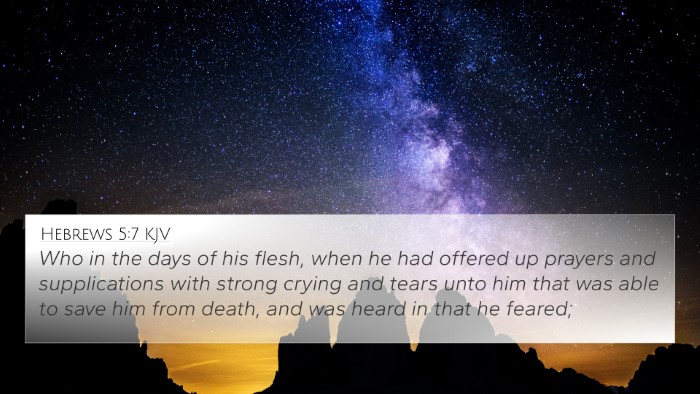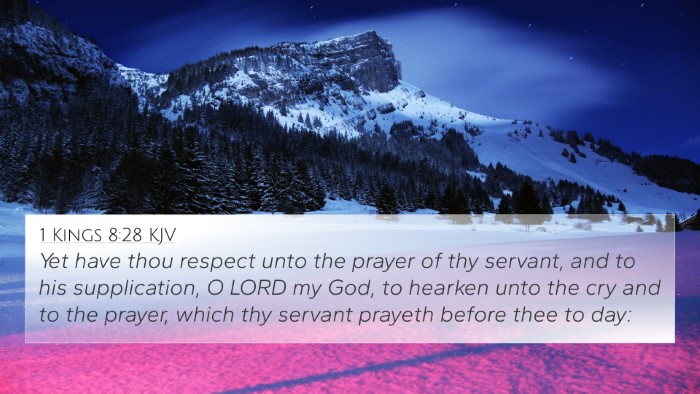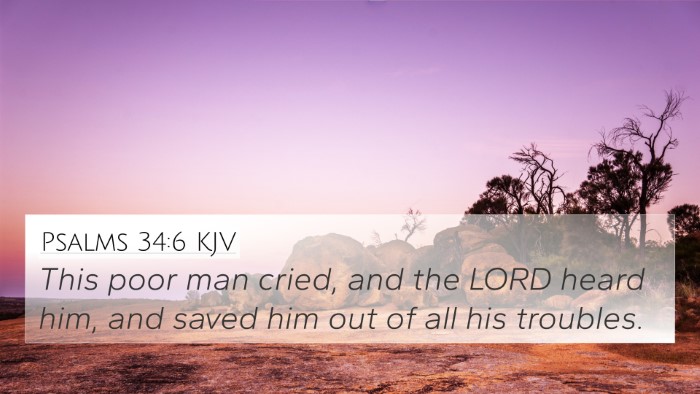Understanding 2 Samuel 22:7
2 Samuel 22:7 states: "In my distress I called upon the Lord, and cried to my God: and he did hear my voice out of his temple, and my cry did enter into his ears." This verse portrays a profound moment of distress and the immediate recourse to God, highlighting the themes of divine support and intervention in times of trouble.
Meaning and Interpretation
This verse encapsulates the essence of prayer and the assurance that God listens to the cries of those in distress. Drawing from public domain commentaries, we can delve into the meanings and contextual implications of this verse.
-
Matthew Henry's Commentary:
Henry emphasizes the importance of calling upon the Lord during times of trouble. He highlights that the psalmist (David) acknowledges the gravity of his situation but instead of succumbing to despair, he turns to God. This act of calling out in distress is portrayed as a vital step for believers, demonstrating an intimate relationship with the Almighty.
-
Albert Barnes' Notes:
Barnes notes the specificity of God's response to the cries of His people. He points out that the temple represents God's dwelling place, symbolizing His readiness to hear and assist those who seek Him earnestly. The verse underlines an assurance that God is not distant but actively involved when His people call out to Him.
-
Adam Clarke's Commentary:
Clarke highlights the nature of distress as an integral part of the human experience, advocating for the act of reaching out to God in these moments. He explores the idea that genuine cries for help amplify the believer's faith, showing that distress can lead to a stronger reliance on God’s power.
Cross-References and Connections
This verse is rich with connections to other scriptures that echo similar themes of prayer, distress, and divine intervention. Here are some pertinent cross-references:
- Psalms 18:6: "In my distress I called upon the Lord, and cried unto my God: he heard my voice out of his temple, and my cry came before him, even into his ears."
- Psalms 34:17: "The righteous cry, and the Lord heareth, and delivereth them out of all their troubles."
- Psalms 120:1: "In my distress I cried unto the Lord, and he heard me."
- Isaiah 30:19: "For the people shall dwell in Zion at Jerusalem: thou shalt weep no more: he will be very gracious unto thee at the voice of thy cry; when he shall hear it, he will answer thee."
- Romans 10:13: "For whosoever shall call upon the name of the Lord shall be saved."
- James 5:16: "The effectual fervent prayer of a righteous man availeth much."
- 1 Peter 5:7: "Casting all your care upon him; for he careth for you."
Thematic Connections
We can observe several thematic connections within the biblical narrative that resonate with the message of 2 Samuel 22:7:
-
Divine Listening: The theme of God listening to the prayers of His people reoccurs throughout scripture, fostering a dialogue between the divine and the faithful.
-
Power in Distress: Distress is often portrayed as a catalyst that drives individuals closer to God, shedding light on the transformative nature of faith in difficult times.
-
God as Deliverer: The repeated motif of God as a savior in times of trouble emphasizes His role as protector and guide, reinforcing the belief that seeking Him leads to salvation.
Application for Today
Understanding the significance of 2 Samuel 22:7 is essential for personal spirituality. Here are practical applications based on the interpretations of this verse:
- Encourage Prayer: In moments of distress, prioritize turning to God through prayer. This establishes a precedent of seeking divine help in every situation.
- Seek Community Support: Connect with others who share faith; pray together in times of need, reinforcing the idea that no one is alone in their struggles.
- Document Your Prayers: Keeping a prayer journal can help reflect on past cries for help and how God responded, fostering gratitude and faith.
Conclusion
2 Samuel 22:7 is a powerful reminder of the importance of calling upon God in times of need. As believers, we are encouraged to engage in heartfelt prayer, confident that our cries do not go unheard. Through the insights of Matthew Henry, Albert Barnes, and Adam Clarke, this verse elucidates the profound relationship between distress, prayer, and divine response, which is a consistent theme throughout scripture.
